Iran and Turkey Pose Problems for Trump in Syria
While the worst violence of Syria’s six-year-long war may be over, a credible settlement is still far off. The Trump administration has boosted the U.S. military presence in Syria. While this enhances Washington’s leverage, it will not alone assure long-term U.S.
Published by The Lawfare Institute
in Cooperation With

While the worst violence of Syria’s six-year-long war may be over, a credible settlement is still far off. The Trump administration has boosted the U.S. military presence in Syria. While this enhances Washington’s leverage, it will not alone assure long-term U.S. interests: The destruction of the Islamic State, a cessation of Syria’s destabilizing refugee flow, and an end to Syria’s transformation into a logistical hub for expanding Iranian and perhaps Russian influence.
To achieve these aims, Washington needs a more holistic approach toward external powers now involved in the Syrian conflict. During the campaign, Trump suggested working with Russia to fight the Islamic State; his secretary of defense seems disinclined to follow through on that proposal. But much of U.S. policy will hinge on the influence of other regional players, Iran and Turkey. Both have vested interests in Syria that do not align well with those of the United States, and the Trump administration will have to manage these unreliable actors carefully as the conflict continues.
Regional Rivalries Persist
Both Iran and Turkey vested in the outcome of the war and justify their military interventions on grounds of national security. The Iranians, relentless backers of Bashar al-Assad’s regime, tout that the 30,000-man armed force they say they directly control are engaged in an “existential” struggle against the Islamic State. In reality, Tehran has overwhelmingly fought non-Islamic State opposition forces along the border with Lebanon, in effect consolidating a land bridge for Hezbollah, Tehran’s most cherished Arab proxy.
Iran’s multi-billion dollar campaign to save Assad is far more about maintaining Syria as a forward base for Tehran’s broader regional ambitions than defeating the Islamic State. Recent amassing of Iran-backed forces on the border with Israel has nothing to do with the Islamic State and everything to do with the Islamic Republic’s ideological desire to threaten the Jewish state.
But what about Turkey? Historically, Turkish-Syrian relations have been tense. Two decades ago, the two countries almost went to war over Hafez al-Assad—the father of Syria’s current leader—providing safe-haven to the Kurdistan Workers Party (PKK), a Kurdish group fighting for a homeland in southeastern Turkey. But, as part of his quest to reset relations with his neighbors in the early 2000s, Turkey’s leader Recep Tayyip Erdogan became one of Assad’s biggest boosters. Prior to the outbreak of civil war in Syria, the two leaders vacationed together on Turkey’s Mediterranean coast, even as Erdogan told Israeli officials he was too busy to meet.
For Erdogan, a Sunni sectarian ideologue at heart, this made sense: He thought he could empower Syria’s Sunni majority population and perhaps win new contracts for Turkish companies.
That amity did not last long once the civil war broke out in 2011. Simply put, Erdogan may have believed his friend to be doomed and made a cynical call to support the opposition. For Erdogan, a Sunni sectarian ideologue at heart, this made sense: He thought he could empower Syria’s Sunni majority population and perhaps win new contracts for Turkish companies. But, as so often happens with Erdogan, whatever he touches turns to lead. Assad held on tenaciously to power. Erdogan may have fanned the flames of Sunni radical groups, never realizing the conflagration could burn out of control. Meanwhile, Syrian Kurds —many of whom sympathize with the PKK— seized advantage of the vacuum to expand their territory and, for the first time in Syria, create an autonomous Kurdish entity. Turkey, which also opposed Iraqi Kurdish federalism until the potential for trade and oil-export agreements became lucrative enough change minds in Ankara, sees the expansion of Kurdish self-rule in Syria as a bridge too far.
For all the talk about renewed realism and reconciliation coming from Ankara, the gulf between Turkey on one hand and Iran and Russia on the other remains wide. Ankara’s July 2016 about-face and turn to pro-Assad Moscow as a partner not only failed to deliver concrete results for Turkey, but also may have eroded Turkey’s position. Last week, the Syrian Kurds announced a military basing agreement with Russia, effectively throwing Erdogan under the bus for the sake of Turkey’s Kurdish enemies.
U.S. Policy and the Regional Politics of Syria
As Trump advances a new Syria strategy, he will need to both stabilize Syria and neutralize the threat an empowered Assad might pose to the wider region. Credibility matters. Turkey’s cynical policy and willingness to switch sides has undermined its influence among all parties and ultimately may have condemned it to face its worst-case scenario: an empowered Assad bitter about Turkey’s betrayal and a permanent Kurdish safe-haven reinforced by the international community.
If Trump can't work through Turkey, there may be other options. Saudi Arabia and other Gulf states may not worry as much about Russian influence in Syria, but they are concerned about Iran consolidating greater control. Faced with lackluster U.S. commitment, however, the Gulf states have instead chosen to focus first on confronting growing Iranian influence closer to home and invested deeply in their military intervention in Yemen.
Credibility matters. Turkey’s cynical policy and willingness to switch sides has undermined its influence among all parties and ultimately may have condemned it to face its worst-case scenario...
If Trump shows that he will not defeat the Islamic State only to cede Syria to Iran, then the Gulf Arabs might return to the fray. As their leaders converged on Washington last week for Trump's summit of the coalition fighting the Islamic State, they advocated for a stronger U.S. commitment against Iran and, according to numerous roundtables Arab leaders held on the sidelines, urged the White House to close the door on President Obama's more accommodating policy toward Iran. While Trump argued throughout his campaign that the United States cannot be the world’s policeman, by showing a firm commitment to allies the United States can avoid that role while still achieving its aims.
As a priority, the Trump White House needs to consolidate the anti-Assad powers to weaken the hand of Iran and Russia. It should not default to the parallel diplomatic negotiations in Astana, which were engineered by Russia mostly to marginalize the United States and its allies.
But while the United States engages in this renewed alliance building effort with an eye to safeguard long-term U.S. interests in the Middle East, it should be clear-eyed about potential pitfalls. In the case of Iran, Trump’s case is straightforward. The Iranians don’t want to be marginalized this late in the Syrian war. They see their military presence on the ground in Syria as entitling them to play a central role in deciding the makeup of future power structure in Damascus.
The notion that Iran is an altruistic power that wants only to defeat the Islamic State is naive. During the Obama administration, officials seemed willing to accept Iran’s help on the ground with Iraqi militias and forces without adequately considering what Iran might expect after the Islamic State’s defeat. Indeed, this is a concern often raised by Iraqi officials privately, if not publicly. While Trump looks to hash out a new Syria strategy, a basic truth should not be lost on him: that any meaningful U.S.-led effort has much to benefit from the support of the Gulf Arab states. They, in turn, have a basic litmus test for Trump: his readiness to stand up to Tehran.
In the case of Turkey, Erdogan will remain a loose cannon. He wavers and hedges his bets—from turning to Russia and now looking to rekindle Turkey’s ties with Israel to counter Iran in Syria—but his inclination to play the anti-American card when expedient should not be lost on the Trump national security team. At best, his erratic behavior has made him an unreliable partner within the NATO alliance. Turkey can be a part of any new Trump strategy, but it should never be its lynchpin.






